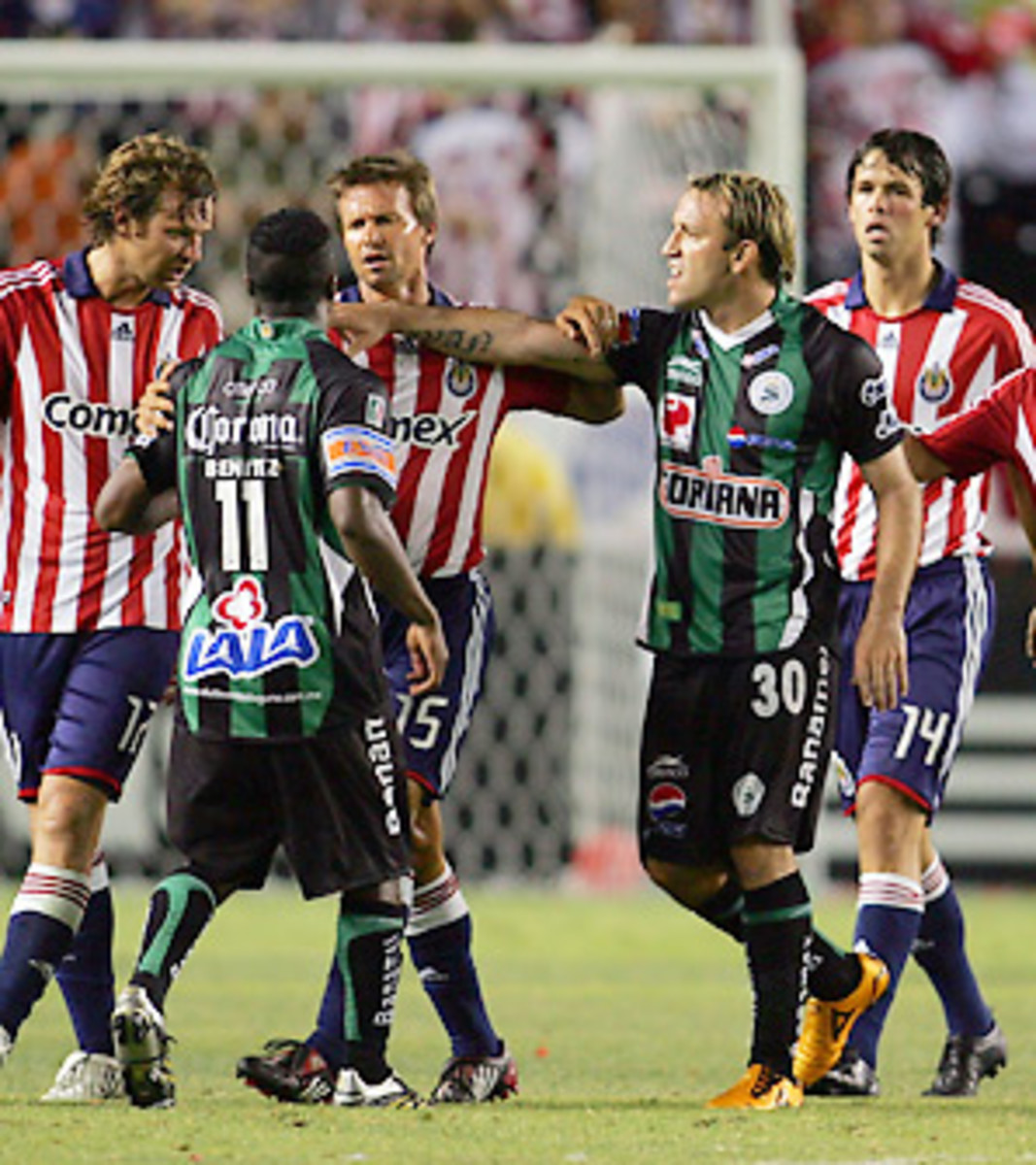In third year, a not so SuperLiga


Just when MLS teams have hit their stride and have found some sort of cohesion, is it really a good time for a break? And not six weeks after the end of one season, Mexican league clubs are supposed to hit full throttle with new-look rosters?
SuperLiga is upon us once more, the logistically challenged tournament that pits MLS also-rans against Mexican league clubs who may or may not want to participate in the first place.
Since the beginning, SuperLiga has been a flawed tournament. In Year Three, however, the flaws are prevalent. The Mexican contingent of participating clubs has regressed so severely that even the product on the field may not be as strong this time around.
When Santos Laguna is the most prestigious Mexican club involved, you know the tournament is in bad shape. It's supposed to pair top MLS teams with top Mexican teams, but none of the four participating Mexican teams even reached the Liguilla playoffs of the recently completed Clausura 2009 season. Three of the clubs -- Santos, Tigres and Atlas -- sacked their coaches during the season and the other club, San Luis, did so after the end of the campaign.
Tigres, in fact, have already sacked another coach. Manuel Lapuente began the season and was replaced by José Pekerman, who has since been fired and replaced by Daniel Guzmán, who began the Clausura '09 season with Santos. And somehow, all that translates into, as the tournament touts, four of the top clubs in Mexico's Primera División.
Now, if the tournament really featured some of the top clubs in the league -- i.e. Chivas de Guadalajara and Club América -- the previous year's standings, form and finish would mean little. There's a certain level of intrigue and interest those clubs bring with them.
But even those clubs fail to see the benefit of SuperLiga. According to tournament rules, the four clubs with the most points in the Clausura and Apertura '08 seasons who aren't participating in the '09-10 CONCACAF Champions League qualified for SuperLiga. Those teams are San Luis (a total of 59 points during that span), Guadalajara (58), Santos (53), Atlas and Tigres (both with 45). Chivas apparently passed on the tournament, thus allowing for both Atlas and Tigres to participate.
MLS teams, meanwhile, must take a break just as things are supposed to be coming together and the clubs prepare for the stretch run and, eventually, the push for the playoffs. Instead, this tournament could turn a season around the wrong way.
SuperLiga destroyed New England a year ago. Entering the tournament, the Revolution were atop the league and had a 10-4-3 record on July 4 but took a month-long break from league play. When they returned, they went 1-3-2 and never recovered. Will SuperLiga destroy Chicago or Kansas City this time around? Or will it cause Chivas USA, already struggling to re-create its early-season success, to continue spiraling out of control?
As far as the Mexican teams are concerned, perhaps one of the four participants can save some face in SuperLiga. Or maybe they will start to turn the page on their year and head into the latter stages of the Apertura '09 season in better form. They have to get something out of this futile exercise known as SuperLiga.
Perhaps the most irrelevant arguments in soccer -- at least in our corner of the globe -- is "Who are the giants of CONCACAF?" Is it Mexico, which has a baker's dozen of World Cup appearances and the '99 Confederations Cup title? Or is it the U.S., which has had Mexico's number for the better part of a decade? The answer: Who cares? Being the giant of CONCACAF is like being the toughest freshman in high school -- you stand no chance against the upperclassmen.
Such is the case for the U.S., which learned the hard way just how tough Italy and Brazil are. But, the U.S. is the best in CONCACAF, right? The Americans have a near spotless record against Mexico since 2000, only losing to El Tri in Mexico City in that span. That translates into regional superiority and the Giant of CONCACAF label, doesn't it? Maybe, but American fans and media seemingly are always incredulous over the lack of acknowledgment from Mexican players, media and supporters over the Americans' supposed regional dominance.
That's because Mexico doesn't fall flat on its face and embarrass itself in international tournaments. Not counting the Gold Cup, which features only CONCACAF teams, the U.S. has tripped over itself time and again in competitive tournaments. Mexico hasn't.
Consider this: The U.S. was embarrassed by Brazil on Thursday in the Confederations as a 10-man U.S. team fell 3-0 to the Seleção. The last time Mexico faced Brazil in an international tournament, it won -- a 2-0 victory in the '07 Copa América. And the time before that? Also a Mexico win, a 1-0 triumph over Brazil in the '05 Confederations Cup.
The U.S. also lost to Italy this tournament, dropping a 3-1 score in its opening match on Monday. Mexico tied Italy the last time they played, in the '02 World Cup. In fact, El Tri tied Italy in their previous meeting, as well, at the '94 World Cup.
Since the U.S.' historic '02 World Cup win over Mexico, here's how the two teams have fared in international tournaments outside of CONCACAF:
United States: '03 Confederations Cup first-round exit, '06 World Cup first-round exit, '07 Copa América first-round exit, '09 Confederations Cup likely first-round exit.
Mexico: '04 Copa América quarterfinals, '05 Confederations Cup semifinals, '06 World Cup Round of 16, '07 Copa América semifinals.
Mexico might be struggling, with four managers since March '08 and possibly not even reaching the World Cup in South Africa next summer. And let's be fair: El Tri's days of dominating the region are long over. But at least Mexico shows up in tournaments. And that's a gigantic accomplishment.
